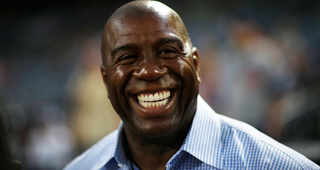This is a family matter. Jeanie Buss kicked her brother Jim out of the front office, fired longtime general manager (and even longer-time Jerry Buss consiglieri) Mitch Kupchak, and installed Magic Johnson as president of basketball operations. Magic shipped out Lou Williams for Corey Brewer and a Rockets first-rounder, with a swiftness that suggested his hiring had been in the works for weeks. Jeanie heeded her deceased father’s instructions for almost exactly four years. He had always wanted Jim to run the personnel side of things, but Jim was unfortunately quite bad at it. Jeanie had been involved with the franchise for nearly her entire adult life. Her dad’s desires bought Jim some time—much more of it, certainly, than he would have had if he had been making signings and trades under, say, Dan Gilbert or Paul Allen—and then she took what was rightfully hers.
The Weinstein Company makes eight to ten movies a year, News Corp is a multinational media conglomerate, and the United States presidency has been passed among kin, so perhaps it’s not blaringly strange that the running of a three billion-dollar NBA franchise involves some metaphorical fratricide, but the Lakers stand out in a league that’s governed mostly by anonymous technocrats and flexing billionaires. They’re not necessarily more internally chaotic than other teams—the franchise that recently sent DeMarcus Cousins away for peanuts comes to mind—but since Jerry Buss’s death in 2013, they’ve been particularly difficult to read because of their convoluted leadership structure. A Thomas Golianopoulos piece from 2015 described the Jeanie/Jim conundrum as such: [Jeanie] has veto power over her brother and general manager Mitch Kupchak. She is their superior. But she does not, and says she will not, execute that veto power. Or she didn’t until Tuesday, anyway.
Whether the Lakers have improved by jettisoning Jim Buss and Mitch Kupchak remains to be seen—the Williams deal, for what it’s worth, looks like a nice if minor piece of business—but they have attained a degree of clarity they’ve lacked since the family patriarch died. Jeanie’s the number one, Magic’s the number two, Rob Pelinka will be general manager beneath Magic, and command trickles downward from there. No more awkward separation of powers, no more guillotine over Jim Buss’s head, because it has already dropped.
Of course, one problem solved doesn’t mean several more might crop up in its wake. As Whitney Medworth points out, Magic Johnson’s not the keenest evaluator of talent. He loved the Bulls bringing in Rajon Rondo, Dwyane Wade, and Michael Carter-Williams last summer. He’s put himself on record as a fan of Dion Waiters, Jimmer Fredette, and Derek Fisher’s coaching prospects. He’s an adherent to Lakers exceptionalism, which is a highfalutin way of saying he thinks the organization should be able to persuade just about any player in the league to come to Los Angeles. It’s the sort of thing that’s gotten the Lakers in trouble in the post-Jerry Buss years, assuming the force of their brand alone is enough to pull talent westward. A return to some imagined essential Lakers-ness will not save the Lakers: competence will.
The stories franchises tell about themselves probably aren’t important to free agents or draftees, but they’re obliquely useful. Success often isn’t more legible than failure, but swept skyward by the rush of joy winning brings, most people don’t ask for explanations. It’s the screwups that need to be accounted for, blame assigned for them, mistakes studied and isolated and circled in red pen.
The Lakers have been great forever. They have, in fact, suffered through fallow periods, but when you think of them, Jerry West and Kareem and Kobe blot out Elden Campbell and Gail Goodrich. The way they explain failure, and avoid lingering on it, is by characterizing it as anomalous. The Trail Blazers have been inconsistent throughout their history because Portland isn’t a premier market, they’ve had a lousy track record with injuries, Stu Inman didn’t think they needed a shooting guard, etc. When the Lakers are bad, it’s because god’s asleep at the wheel.
Magic can sell that as well as anyone, probably because he believes it. Who knows how robust the legs on that slice of evangelism are in this day and age, when Phil Jackson’s Knicks hiring was greeted with some queasy side-eye from New Yorkers before he had made a single move. Aura isn’t what it used to be, or the auras we’re in awe of are much different than they were a decade ago. Sam Hinkie had never been the face of anything before he showed up in Philadelphia and left with a sizable, vocal portion of the fanbase having canonized him simply for drafting injured players and losing a bunch of games. You can still sell vision and create acolytes, but the pitch needs to be state-of-the-art. A certain boardroom-bred seriousness helps, as does an Ivy League degree in some field that’s only vaguely applicable to basketball. The era of the highly respected ex-player personnel man is nearly past.
Really, if Brandon Ingram turns out to be a superstar, or if the Lakers draft one this summer, most of this is moot. Magic might come off as smilingly oblivious, but he knows the roster he’s taking over is tattered and young. He knows it’s time for the Lakers to pack it in and nab the best draft pick they can this year. That is all he needs to understand at this moment. Everything else—the intimate knowledge of the Lakers myth, the trade market smarts, the talent acquisition acumen—will reveal itself as sufficient or useful or irrelevant or harmful in time. For now, he provides all that he is: Magic Johnson, running the Lakers with Jeanie Buss. It sounds right, at least.



